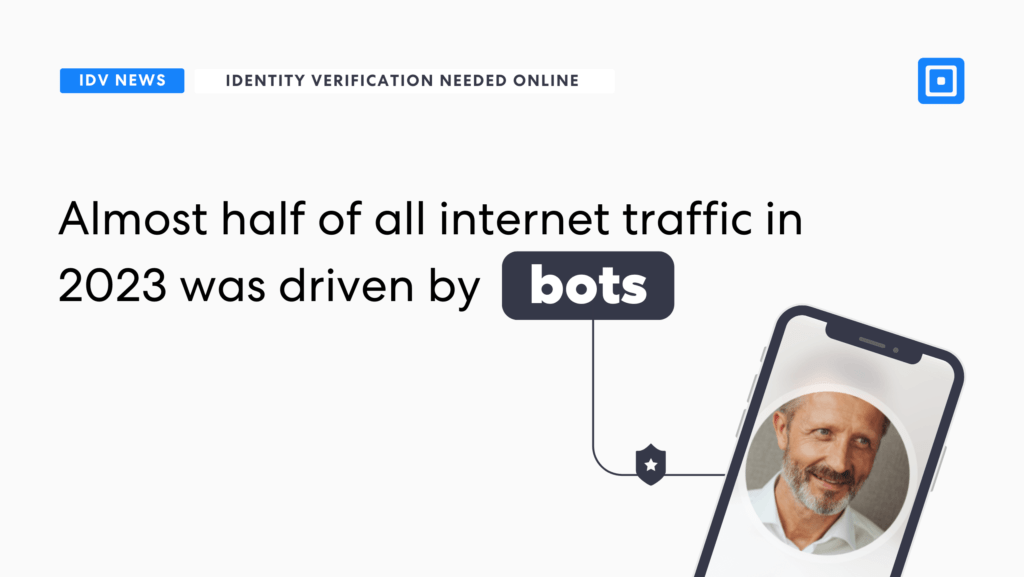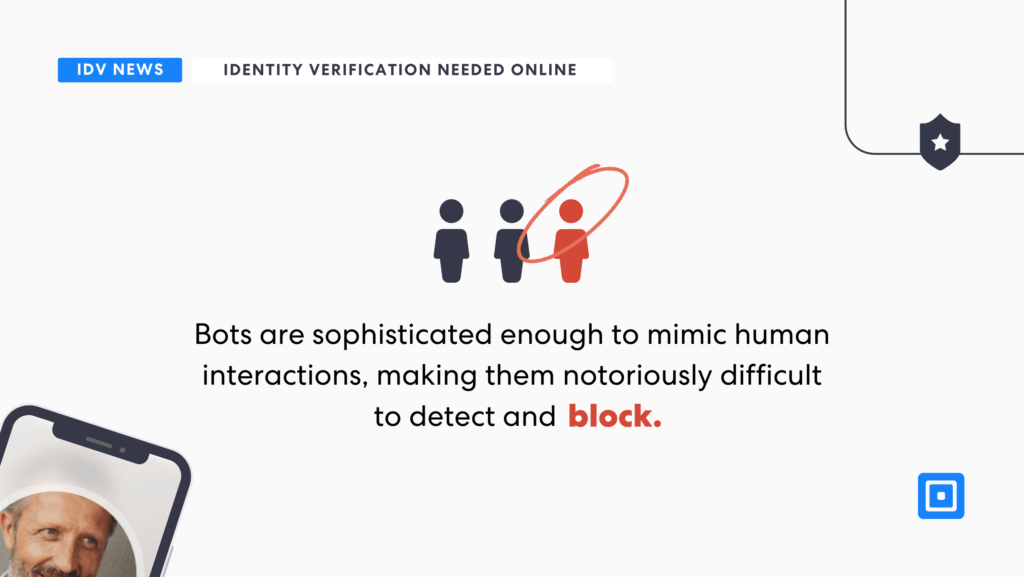في عام 2023، كان ما يقرب من نصف حركة الإنترنت بالكامل مدفوعة بالروبوتات. وعلى الرغم من التفاعل مع الروبوتات على أساس يومي، إلا أن معظم الناس لا يزالون يجهلون هذه الحقيقة المذهلة. إن سذاجتنا لا ترجع إلى الجهل بل لأن الروبوتات الحديثة يمكنها تقليد التفاعلات البشرية بدقة مثيرة للقلق. مما لا شك فيه أن هذا يجعل الروبوتات خطيرة للغاية، حيث أصبحنا غير قادرين على التمييز بين الأصالة والخداع. وبدون تدابير معرفة العميل الضرورية، فإننا معرضون لخطر أن يكون المحتوى الذي نستهلكه نتاجًا للتدخل الاصطناعي. يجب أن تتضمن وسائل التواصل الاجتماعي فحوصات التحقق من الهوية التي تستفيد من تقنية اكتشاف الحيوية والتحقق من الهوية اللازمة للكشف عن الملفات الشخصية الاحتيالية قبل وقوع الهجمات.
تدعو الإحصائيات الأخيرة إلى اتخاذ إجراءات عاجلة من جانب المنصات الإلكترونية. فالمستخدمون معرضون حاليًا لهجمات احتيالية على وسائل التواصل الاجتماعي ومواقع المواعدة، وهو ما أدى في عام 2023 إلى خسائر بمتوسط 8234 جنيهًا إسترلينيًا إن الروبوتات تسيطر بشكل متزايد على الإنترنت، وتشير التوقعات إلى أنها ستتولى قريبًا معظم حركة المرور على الإنترنت. ولا يؤدي تأثيرها إلى عمليات احتيال عبر الإنترنت فحسب، بل إنها تشكل المجتمع أيضًا من خلال الاستفادة من الأحداث السياسية والاجتماعية والاقتصادية وإعادة كتابة السرديات النقدية.
معركة بين الروبوتات
ومن الأمثلة على ذلك حالة وقعت في أوائل عام 2024، حيث خاضت جيوش من الروبوتات معركة على وسائل التواصل الاجتماعي بشأن حادثة البالون التجسسي الصيني. وقد فحص باحثون من جامعة كارنيجي ميلون 1.2 مليون تغريدة وقد توصلت الدراسة إلى بعض النتائج المثيرة للاهتمام. فقد كانت التغريدات الصينية مصطنعة في الأساس، حيث كتبت الروبوتات 64% من التغريدات. ومع ذلك، استخدمت الولايات المتحدة أيضًا الروبوتات لمحاولة تحويل اللوم، حيث كتبت الروبوتات 35% من تغريداتها.

تشير هذه الحالة إلى حقيقة مفادها أن العديد من الروايات التي نستهلكها كل يوم عبر منصات الإنترنت مثل تويتر أو فيسبوك لا يمكن الوثوق بها. وفي حين لا تتحمل أي منظمة أو كيان المسؤولية عن تمكين نتائج حركة المرور التي يقودها الروبوت، يبدو أن زيادة المساءلة قد تكون ضرورية من أجل معالجة الافتقار إلى عمليات التحقق الصارمة من المستخدمين.
إن المنصات مثل فيسبوك منفتحة بشأن عدد الحسابات التي يتعين عليها حذفها كل ربع سنة من أجل البقاء على اطلاع على الحسابات الاحتيالية. ومن المؤكد أن من الإيجابي أن تضع Meta على رأس أولوياتها إزالة هذه الحسابات وأن تكون شفافة بشأن القيام بذلك. ومع ذلك، ربما ينبغي أن يتحول التركيز إلى منع هؤلاء المستخدمين من التسجيل في المنصة في المقام الأول.
في الربع الرابع من عام 2023، أزال فيسبوك ما يقرب من 700 مليون حساب وهمي على مواقع التواصل الاجتماعي بعد إزالة 827 مليون مستخدم في الربع السابق. ومع ذلك، بغض النظر عن عدد المستخدمين المشبوهين الذين تمت إزالتهم، فمن المؤكد أن المزيد منهم يعودون للظهور. وهذا يشير بقوة إلى أن المشكلة تكمن في عملية التسجيل. على Instagram أو Twitter، يمكن لأي شخص إنشاء حساب على وسائل التواصل الاجتماعي بسرعة كبيرة دون الحاجة إلى التحقق من هويته، مما يعرض جميع المستخدمين للخطر.
ماذا يعني هذا بالنسبة للاحتيال؟
في الواقع، تبدأ أغلب حالات الاحتيال عبر الإنترنت، حيث تعد منصات التواصل الاجتماعي مكانًا رائعًا للمحتالين للاختباء وراء اسم مزيف وصورة شخصية. ولهذا السبب، غالبًا ما تكون التفاعلات على مواقع التواصل الاجتماعي احتيالية، مع تنفيذ عدة أنواع من الهجمات، مثل عمليات الاحتيال الاستثمارية أو الرومانسية.
بالكاد 80% من عمليات الاحتيال إننا ندرك أن التغيير في عالمنا اليوم يتطلب البدء عبر الإنترنت، وقد طالبنا منذ فترة طويلة شركات التواصل الاجتماعي والتكنولوجيا ببذل المزيد من الجهود لحماية مستخدميها.
تحدث متحدث باسم لويدز مؤخرًا إلى صحيفة صنداي تايمز، قائلًا: "تبدأ حوالي 80% من عمليات الاحتيال عبر الإنترنت، وقد طالبنا منذ فترة طويلة شركات وسائل التواصل الاجتماعي والتكنولوجيا ببذل المزيد من الجهود لمنع ذلك". حماية المستخدمين "ومساعدة الضحايا الأبرياء في استرداد أموالهم". إن لويدز والمجموعات المصرفية الأخرى تدرك العبء الذي يتحمله هؤلاء الضحايا، حيث يُطلب منهم غالبًا تعويض الضحايا عن حالات الاحتيال عبر الإنترنت. وتؤثر هذه الخسائر باستمرار على اقتصاد المملكة المتحدة، سواء كان الأفراد أو البنوك هم من يتحملون الضرر، مما يؤثر على الناتج المحلي الإجمالي الوطني.
هل فات الأوان لتطبيق KYC على وسائل التواصل الاجتماعي؟
إذا لم تغير منصات التواصل الاجتماعي موقفها من عمليات التسجيل، فقد نجد قريبًا أن الروبوتات تتحكم في معظم خلاصات وسائل التواصل الاجتماعي الخاصة بنا. وفي حين أن هذا من شأنه أن يضيف بعض التعقيد إلى عملية التسجيل، إلا أنه لا يزال من الممكن الحفاظ على تجربة مستخدم إيجابية باستخدام الأدوات المناسبة المدعومة بالذكاء الاصطناعي والتي يمكنها إجراء عمليات التحقق من الهوية في غضون ثوانٍ.
من المتوقع أن تتجاوز الروبوتات الآلية قريبًا نسبة حركة الإنترنت القادمة من البشر.
صرحت نانهي سينغ، المديرة العامة لأمن التطبيقات في شركة إمبيرفا، في مقالة إخبارية حديثة أن "الروبوتات الآلية ستتجاوز قريبًا نسبة حركة الإنترنت القادمة من البشر، مما يغير الطريقة التي تتعامل بها المؤسسات مع بناء وحماية مواقعها الإلكترونية وتطبيقاتها. ومع طرح المزيد من الأدوات التي تعمل بالذكاء الاصطناعي، سوف تصبح الروبوتات موجودة في كل مكان"يجب على المؤسسات الاستثمار في أدوات إدارة الروبوتات وأمان واجهة برمجة التطبيقات لإدارة التهديد الناتج عن حركة المرور الآلية الضارة."

في ضوء هذه التوقعات، من الأهمية بمكان أن تعيد المنصات عبر الإنترنت النظر في أولوياتها وتنفذ بنية تحتية متطورة لإثبات الهوية لحماية المستخدمين وتأمين مواقعهم. ومع حكومة حزب العمال الجديدة في المملكة المتحدة، قد تكون هذه المنصات أيضًا عرضة لضرورة تعويض ضحايا الاحتيال اعتبارًا من أكتوبر 2024. لمزيد من المعلومات حول التغييرات القادمة في المساءلة عن الاحتيال عبر الإنترنت، اقرأ مقالتنا حول حزب العمال يحاسب شركات التكنولوجيا الكبرى.
الخطوات التالية لمواقع أكثر أمانًا
يقدم برنامج IDV نهجًا متطورًا للتخفيف من حركة المرور التي يقودها الروبوت على وسائل التواصل الاجتماعي من خلال فرض إجراءات صارمة للتحقق من صحة المستخدم وتدابير التحقق من صحة الهوية. يمكن لهذه المنصات تنفيذ ما يلي:
فحص المستندات: تتحقق هذه الفحوصات من أن الهوية المقدمة أصلية وصالحة من خلال فحص الوثائق الرسمية مثل جوازات السفر للتأكد من شرعيتها.
التحقق من الهوية البيومترية:يقوم التحقق من الهوية البيومترية بتحليل التعبيرات الدقيقة ويضمن أن وثيقة الهوية المقدمة تتطابق مع المستخدم. كما أنه يستفيد من تقنية اكتشاف الحياة لتحديد ما إذا كان المستخدم على قيد الحياة ومتواجدًا جسديًا أثناء العملية.
تاكيد السن:إن التأكد من أن المستخدمين ليسوا قاصرين أمر بالغ الأهمية للحفاظ على سلامة هذه المواقع الإلكترونية. ويجب التحقق من العمر لتقليل خطر تعرض الأطفال لأي نوع من أنواع الإساءة عبر الإنترنت.
من خلال دمج هذه الأساليب، يمكن لمنصات IDV تقليل حركة المرور على الروبوتات بشكل فعال وحماية منصات الوسائط الاجتماعية من الاستغلال. تضمن هذه التدابير أن الحسابات الجديدة تنتمي إلى أفراد حقيقيين، مما يمنع الروبوتات من نشر البريد العشوائي أو المعلومات المضللة.
خدمات معرفة العميل عبر وسائل التواصل الاجتماعي
أصبحت البنية الأساسية القوية للتحقق من الهوية والتحقق من الهوية الإلكترونية أكثر أهمية من أي وقت مضى لمواجهة تحديات الاحتيال المتزايد عبر الإنترنت بشكل فعال. هناك حاجة إلى تنفيذ عمليات التحقق المتقدمة من المستندات والفحوصات البيومترية واكتشاف صحة البيانات لحماية المستخدمين من الهجمات الاحتيالية.
ComplyCube تشتهر شركة لوجيستكس بفحوصات التحقق من الهوية المتطورة (IDV)، والاستفادة من تكنولوجيا الكشف عن الهوية البيومترية المعتمدة من ISO 30107-3 وPAD Level 2 المتقدمة للتحقق مما إذا كان الشخص الذي يقدم وثيقة الهوية هو نفس الشخص.

اتصل بهم فريق الامتثال الخبراء لتعلم المزيد حول حماية منصتك عبر الإنترنت من الاحتيال.



